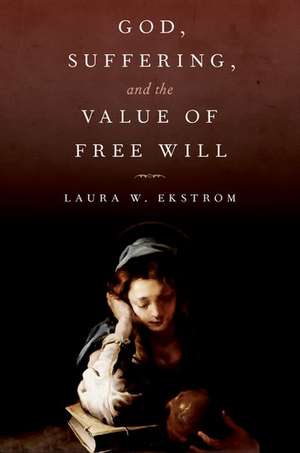God, Suffering, and the Value of Free Will
Autor Laura W. Ekstromen Limba Engleză Hardback – 30 iul 2021
Preț: 527.07 lei
Preț vechi: 756.13 lei
-30% Nou
Puncte Express: 791
Preț estimativ în valută:
100.89€ • 105.99$ • 84.79£
100.89€ • 105.99$ • 84.79£
Carte disponibilă
Livrare economică 07-13 februarie
Livrare express 04-08 februarie pentru 121.55 lei
Preluare comenzi: 021 569.72.76
Specificații
ISBN-13: 9780197556412
ISBN-10: 0197556418
Pagini: 248
Dimensiuni: 239 x 155 x 25 mm
Greutate: 0.45 kg
Editura: Oxford University Press
Colecția OUP USA
Locul publicării:New York, United States
ISBN-10: 0197556418
Pagini: 248
Dimensiuni: 239 x 155 x 25 mm
Greutate: 0.45 kg
Editura: Oxford University Press
Colecția OUP USA
Locul publicării:New York, United States
Recenzii
Ekstrom's writings focus on issues of responsibility and free will. This book explores philosophical attempts to reconcile God's existence with the existence of suffering and evil....Ekstrom's writing is lucid, and she presents complex philosophical ideas with clarity, looking at the works of those with whom she disagrees charitably and giving them the strongest possible reading. She also argues for paying attention to emotional knowledge and treating evil not simply as a logical problem. This is an important book for students of the philosophy of religion...Summing Up: Recommended. Upper-division undergraduates; graduate students.
Overall the book constitutes a powerful argument with which I recommend all theistic philosophers engage.
This is a courageous book. Laura Ekstrom's treatment of the problem of suffering is far and away the most honest, sensitive, and thoughtful work I have ever seen on the topic. Ekstrom takes on the problem of suffering without flinching, displaying a just appreciation of the extent and nature of pain, all the while evincing a deep sympathy for religious life. This lucid and sensitive work should be read by theists and atheists alike. It's an enormously important contribution to the philosophical literature.
The free will defense has feet of clay. The problem of evil has left its unquiet grave and stalks anew, a zombie hungry for theist brains. So says Laura Ekstrom (more or less) in this challenging new book. Her arguments deserve a wide readership—and a good answer.
Laura Ekstrom is the very rare sort of philosopher who has done important work on both sides of the debate over the problem of evil. This is perhaps part of the explanation for why she is so successful in treating her opponents' positions with the level of care, rigor, and philosophical and theological sensitivity on display in this book. Whereas Ekstrom's earlier work developed what she calls the "divine intimacy" theodicy, this book subjects both theodical and defensive approaches to the problem of evil (including her own) to trenchant critique. It is an important contribution to the literature in philosophy of religion and quite simply the best and most comprehensive anti-theistic treatment of the problem of evil that I have encountered.
Overall the book constitutes a powerful argument with which I recommend all theistic philosophers engage.
This is a courageous book. Laura Ekstrom's treatment of the problem of suffering is far and away the most honest, sensitive, and thoughtful work I have ever seen on the topic. Ekstrom takes on the problem of suffering without flinching, displaying a just appreciation of the extent and nature of pain, all the while evincing a deep sympathy for religious life. This lucid and sensitive work should be read by theists and atheists alike. It's an enormously important contribution to the philosophical literature.
The free will defense has feet of clay. The problem of evil has left its unquiet grave and stalks anew, a zombie hungry for theist brains. So says Laura Ekstrom (more or less) in this challenging new book. Her arguments deserve a wide readership—and a good answer.
Laura Ekstrom is the very rare sort of philosopher who has done important work on both sides of the debate over the problem of evil. This is perhaps part of the explanation for why she is so successful in treating her opponents' positions with the level of care, rigor, and philosophical and theological sensitivity on display in this book. Whereas Ekstrom's earlier work developed what she calls the "divine intimacy" theodicy, this book subjects both theodical and defensive approaches to the problem of evil (including her own) to trenchant critique. It is an important contribution to the literature in philosophy of religion and quite simply the best and most comprehensive anti-theistic treatment of the problem of evil that I have encountered.
Notă biografică
Laura W. Ekstrom is Francis S. Haserot Professor of Philosophy at William & Mary. Ekstrom is the author of Free Will: A Philosophical Study (Westview Press, 1999) and the editor of Agency and Responsibility: Essays on the Metaphysics of Freedom (Westview Press, 2000). Her articles on free agency, autonomy, moral responsibility, chance, suffering, and compassion have appeared in journals including Synthese, Philosophy and Phenomenological Research, American Philosophical Quarterly, Midwest Studies in Philosophy, Journal of Medicine and Philosophy, Philosophical Studies, and Australasian Journal of Philosophy, as well as in edited collections published by such presses as Blackwell, Cambridge University Press, and Oxford University Press.
